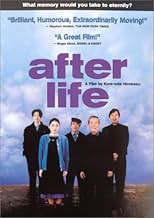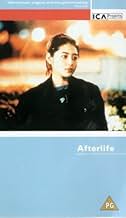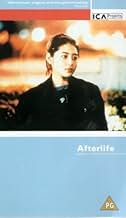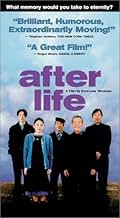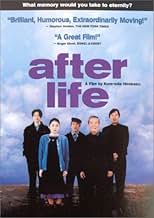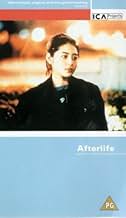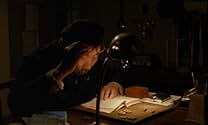IMDb RATING
7.6/10
15K
YOUR RATING
After death, people have a week to choose only one memory to keep for eternity.After death, people have a week to choose only one memory to keep for eternity.After death, people have a week to choose only one memory to keep for eternity.
- Awards
- 7 wins & 8 nominations total
Arata Iura
- Takashi Mochizuki, counselor
- (as Arata)
- Director
- Writer
- All cast & crew
- Production, box office & more at IMDbPro
Featured reviews
I saw this movie in the theatre. It is always a pleasure to be at a viewing where there is spontaneous applause at the end. This is one of those movies. It speaks to your very soul. I understand that quite a few of the cast were not professional actors, but spoke from their own lifetime experiences. There is a very simple premise: you get to choose the most favourite moment of your life after you are dead and then help to recreate it, staging, cast of characters, scene - and the total non-professional manufacturing of this moment I found very touching - so that it can be savoured for all eternity. The perfect heaven. Of course some recently dead people can't think of anything, some remember very simple things, some are given assistance, like the record of their entire life in video form to review and extract a memory, if they can. The cast and direction is brilliant. I shudder to think of what modern Hollywood would do with this ("What dreams may come" being a case in point). It was all extremely simple and believable and has certainly had me talking about it for quite a while since I have seen it. 8 out of 10.
This was a perfect film for watching on a quiet Sunday morning. It made me reflect on my own life, and realize that I would probably be one of the counselors in the afterlife.
It was brilliantly written and directed and one of the most innovative stories I have seen on screen. After death, you spend a week in a way-station to reflect on your life and take one memory with you. It is not an easy process as I discovered.
I was interested in the fact that some people can remember all the way back to the womb. Picking a happy memory before I was an adult is almost impossible for me, so I cannot imagine going back that far. Most people remember only to age three or four.
I was fascinated with the man who wanted to leave behind some evidence of his existence. One man could not remember any happy memories in his 70+ years, so he had to sit through video tapes, one for each year of his life, to help him. It seems that there was a connection with one of the counselors and this played out in an unusual way at the end. Choosing your best memory as the fact that you were someone else's best memory and that you made one person happy.
Most of us fall into the category expressed by one man. "I had a so-so education, a so-so job, a so-so marriage, and a so-so retirement." How do you pick a happy or important memory from that? I also liked one man's response when he picked his memory after lamenting that most of the memories of his life were bad. After being told he would forget all the bad memories, he exclaimed, "That truly is heaven." An unusual film that will be in my memory for a long time.
It was brilliantly written and directed and one of the most innovative stories I have seen on screen. After death, you spend a week in a way-station to reflect on your life and take one memory with you. It is not an easy process as I discovered.
I was interested in the fact that some people can remember all the way back to the womb. Picking a happy memory before I was an adult is almost impossible for me, so I cannot imagine going back that far. Most people remember only to age three or four.
I was fascinated with the man who wanted to leave behind some evidence of his existence. One man could not remember any happy memories in his 70+ years, so he had to sit through video tapes, one for each year of his life, to help him. It seems that there was a connection with one of the counselors and this played out in an unusual way at the end. Choosing your best memory as the fact that you were someone else's best memory and that you made one person happy.
Most of us fall into the category expressed by one man. "I had a so-so education, a so-so job, a so-so marriage, and a so-so retirement." How do you pick a happy or important memory from that? I also liked one man's response when he picked his memory after lamenting that most of the memories of his life were bad. After being told he would forget all the bad memories, he exclaimed, "That truly is heaven." An unusual film that will be in my memory for a long time.
9KFL
The Afterlife is best thought of as a kind of thought experiment, perhaps in the same vein as Groundhog Day. The point is not that this may be what we experience after death; it is rather that we need to think more about what it is in this life that we'd really like to keep with us forever.
This point needs emphasis. When asked what we want most in life, most of us will talk about our career, or a business venture perhaps, or some other accomplishment. This movie suggests that these kinds of things may not, at the end of the day, be so important as some other experiences we may have. In any case, it challenges us to rethink what it is we really value.
Some reviewers complain about the quite ordinary surroundings and "poor production values" of the movie. I prefer to think of the choice of sets etc as humble and realistic. Could any movie, whatever its budget, ever possibly do justice to this subject matter?
Much of this movie is devoted to explorations of the lives of a number of rather ordinary people, trying to identify their most cherished memories. Some reviewers have condemned The Afterlife as boring, boring, BORING on this account. It all depends on whether other people interest you. If all you want to see is car chases, sex, explosions, cool special effects,...avoid this movie. Only, it's worth noting that the lives and thoughts of others may help us to better understand ourselves. And nowhere more so than in this movie.
This point needs emphasis. When asked what we want most in life, most of us will talk about our career, or a business venture perhaps, or some other accomplishment. This movie suggests that these kinds of things may not, at the end of the day, be so important as some other experiences we may have. In any case, it challenges us to rethink what it is we really value.
Some reviewers complain about the quite ordinary surroundings and "poor production values" of the movie. I prefer to think of the choice of sets etc as humble and realistic. Could any movie, whatever its budget, ever possibly do justice to this subject matter?
Much of this movie is devoted to explorations of the lives of a number of rather ordinary people, trying to identify their most cherished memories. Some reviewers have condemned The Afterlife as boring, boring, BORING on this account. It all depends on whether other people interest you. If all you want to see is car chases, sex, explosions, cool special effects,...avoid this movie. Only, it's worth noting that the lives and thoughts of others may help us to better understand ourselves. And nowhere more so than in this movie.
Afterlife is another film offering an answer to the unanswerable question "What happens after you die? ". Although this has been asked many times through cinema in the past, few films have answered as elegantly as Afterlife.
Directly after dying the departed are received by a group of counsellors who assist them in finding what was, for them, the most beautiful and perfect, single experience of their lives. For some the choice is easy and they are instantly able to provide the moment, which, once recreated by technicians, they remain in forever but the majority of the film concentrates upon those who are unable to find their perfect moment, and need extra help to recall past loves and lost days of their youth. The institution has the perfect means to assist this choice, with the complete life of everyone on grainy home-video, perhaps a comment on the tehcnology and recording-obsessed Japanese.
Many of the scenes are visually exceptional, especially those in the snow and everything seems very real, and, ironically, down-to-earth, especially the school building being used throughout the film giving an institutional feeling, but the interaction between the staff is where the film holds its true strength. Especially interesting is the relationship between Shiori, a newly employed worker, and Mochizuki, her mentor, which develops throughout. The film is slow to start due to the documentary style often used, but proceeds in an enveloping manner holding your attention to the end. Along with "Heaven can wait" and "Beetlejuice" this film offers another novel look at life, death and the hereafter.
The Japanese title was "Wandafuru raifu" (wonderful life, after Frank Capra) and, even though the film is dealing with death, it is a statement of how wonderful life is.
I loved this film and it stuck me stunningly and reminded me of how good films can be when they try.
Directly after dying the departed are received by a group of counsellors who assist them in finding what was, for them, the most beautiful and perfect, single experience of their lives. For some the choice is easy and they are instantly able to provide the moment, which, once recreated by technicians, they remain in forever but the majority of the film concentrates upon those who are unable to find their perfect moment, and need extra help to recall past loves and lost days of their youth. The institution has the perfect means to assist this choice, with the complete life of everyone on grainy home-video, perhaps a comment on the tehcnology and recording-obsessed Japanese.
Many of the scenes are visually exceptional, especially those in the snow and everything seems very real, and, ironically, down-to-earth, especially the school building being used throughout the film giving an institutional feeling, but the interaction between the staff is where the film holds its true strength. Especially interesting is the relationship between Shiori, a newly employed worker, and Mochizuki, her mentor, which develops throughout. The film is slow to start due to the documentary style often used, but proceeds in an enveloping manner holding your attention to the end. Along with "Heaven can wait" and "Beetlejuice" this film offers another novel look at life, death and the hereafter.
The Japanese title was "Wandafuru raifu" (wonderful life, after Frank Capra) and, even though the film is dealing with death, it is a statement of how wonderful life is.
I loved this film and it stuck me stunningly and reminded me of how good films can be when they try.
The movie is told in such a way that the people coming in reveals themselves in such a way that they all realize that there is a part of themselves in which it is truly good, even if it is deeply buried. The way it is filmed, as if it is a documentary, provides the cunning realism that you would not ordinarily achieve in regular film. Even at the end, we discover the true reason one of the counselor stayed around instead of moving on. Truly a touching and thought provoking film. It will make you try to think for yourself which memory you would cherish forever, even if it is single one.
Did you know
- TriviaMuch of the action in After Life is shown as interviews conducted with the recently deceased regarding their lives. Some of these interviews were scripted, but many were done impromptu, with real people (not actors) reminiscing about their own lives.
- Quotes
Kenji Yamamoto, who wants to forget his past: Say I choose a memory, from when I was eight or ten years old. Then I'll only remember how I felt back then? I'll be able to forget everything else? Really? You can forget? Well, then that really is heaven.
- How long is After Life?Powered by Alexa
Details
Box office
- Gross US & Canada
- $801,985
- Opening weekend US & Canada
- $11,791
- May 16, 1999
- Gross worldwide
- $801,985
Contribute to this page
Suggest an edit or add missing content



